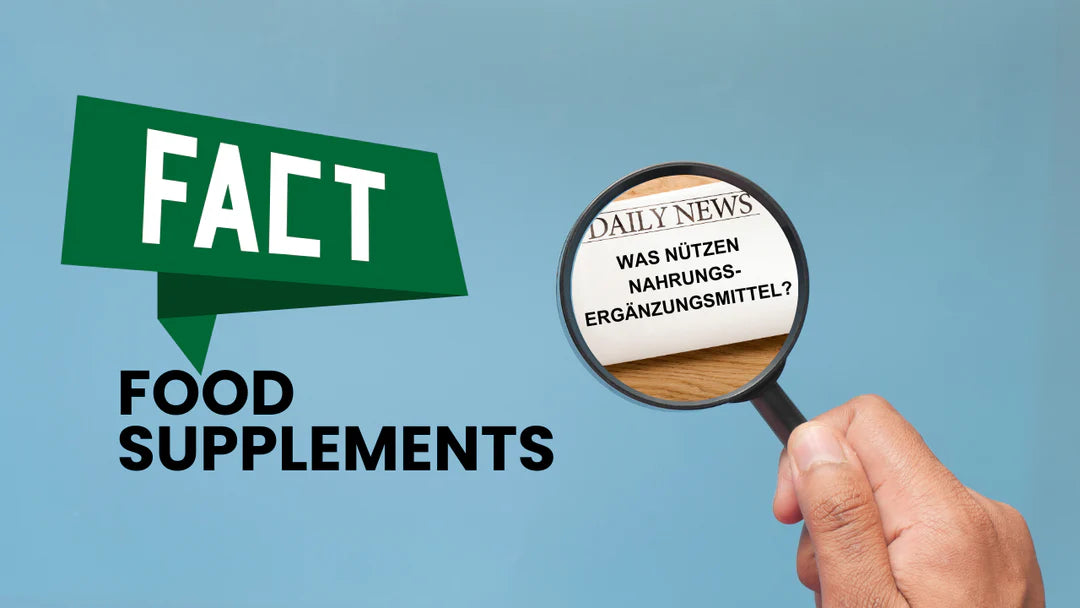Una y otra vez puedes encontrar artículos en Internet o en la prensa advirtiendo contra el uso de suplementos dietéticos. En general, estos artículos se centran en el hecho de que los suplementos dietéticos sólo tienen un beneficio en casos excepcionales. Además, se advierte de los riesgos para la salud de tomarlos y de su contaminación.
Pero, ¿qué son realmente los complementos alimenticios? Según la Directiva 2002/46/CE de la UE, los complementos alimenticios se definen como productos alimenticios destinados a complementar la dieta general. Consisten en nutrientes concentrados u otras sustancias con un efecto nutricional o fisiológico, como vitaminas, minerales, aminoácidos, ácidos grasos esenciales, fibras alimentarias, extractos de plantas u otros ingredientes.
¡Aquí está nuestra comprobación de hechos!
¿Los complementos alimenticios pueden contener sustancias nocivas o estar contaminados? La delincuencia organizada ofrece productos en Internet, no debes comprar productos en Internet.
En general, los fabricantes son responsables de garantizar que sus productos cumplen el marco legal. Esto está regulado por una serie de leyes nacionales y de la UE. Por ejemplo, las vitaminas y los minerales están definidos con precisión, incluida la forma química que se permite ingerir y una cantidad diaria de referencia. En cuanto al uso de plantas en determinados grupos de alimentos, Bélgica(1) e Italia(2), por ejemplo, han promulgado normativas para el uso de plantas en complementos alimenticios.
Desaconsejar la compra de productos online es, por supuesto, una bofetada en la cara de todos los fabricantes, especialmente en un mundo en el que las compras online son cada vez más populares. Sin embargo, los productos de las tiendas locales a menudo pueden ser muy inferiores a los que se ofrecen en Internet en términos de calidad.
NUESTRO CONSEJO: Busca fabricantes que fabriquen sus productos en la UE, los sometan a pruebas periódicas, hagan públicos los informes de los expertos y ofrezcan total transparencia sobre los ingredientes.
Los complementos alimenticios son especialmente populares entre los deportistas y a menudo prometen efectos mágicos.
En general, los deportistas están mucho más concienciados con la salud y, por tanto, también más informados y abiertos cuando se trata del tema de los suplementos nutricionales. Son conscientes de los numerosos beneficios de los paquetes de nutrientes.
Las declaraciones de propiedades saludables en relación con los complementos alimenticios están reguladas por el Reglamento de la UE sobre declaraciones de propiedades saludables (4). Los fabricantes reputados se guían por estas declaraciones.
Los suplementos de vitamina D pueden ayudar a cubrir las necesidades en invierno.
Ciertamente, este hecho se conoce desde hace varias décadas y no debería ser una novedad para nadie. En general, la gente pasa cada vez más tiempo en interiores, ya sea en el trabajo o en casa. La vitamina D sólo puede producirse bajo la piel con la ayuda de la luz solar directa. Los últimos estudios demuestran que en nuestra latitud alrededor del 80% de las personas tienen una carencia y, en algunos casos, una carencia grave (5). Por tanto, tiene sentido tomar vitamina D durante todo el año, ya que la mayoría de la gente sigue trabajando en interiores incluso en verano.
Las personas que siguen una dieta vegana tienden a tener carencia de hierro
Los estudios dicen exactamente lo contrario. Un gran estudio con 65.000 participantes de Inglaterra (6) llegó a la conclusión de que los veganos y los vegetarianos tenían más probabilidades de sufrir carencias de vitamina B12, vitamina D, calcio y zinc, pero no de hierro.
Los complementos alimenticios no sustituyen a la comida real, que ya cubriría las necesidades de (micro)nutrientes.
En general, esto es cierto, pero ¿quién lleva una dieta equilibrada y sana hoy en día? La oferta de comida rápida y productos precocinados altamente procesados supera con creces la disponibilidad de alimentos ricos en nutrientes.
En 2004, un estudio pionero (7) sobre frutas y verduras descubrió que la mayoría de los cultivos de huerta han disminuido significativamente en todos los aspectos -desde las proteínas y el calcio hasta el hierro y la vitamina C- desde 1950. 43 alimentos mostraron descensos evidentes y estadísticamente fiables (de hasta el 38%) en 6 nutrientes controlados (proteína, Ca, P, Fe, riboflavina y ácido ascórbico). Las razones radican en la cría excesiva y la producción masiva.
Las personas con enfermedades preexistentes, las mujeres embarazadas, las madres lactantes, los niños y los ancianos deben tener cuidado al tomar complementos alimenticios.
Esto es generalmente cierto y sólo porque sólo hay unos pocos estudios en este ámbito y los fabricantes simplemente quieren protegerse y no ofrecer los productos para este grupo. Así que es mejor ir a lo seguro, es el lema.
Las personas que toman medicamentos deben tener especial cuidado.
La cuestión aquí es si los medicamentos interactúan con los complementos alimenticios o viceversa. En general, es cierto que ciertas sustancias vegetales, como la piperina de la pimienta negra, pueden influir en la absorción de nutrientes y medicamentos. Los fabricantes reputados respetan la norma, generalmente muy estricta, de una ingesta diaria máxima de 2 mg de piperina.
Sin embargo, los fármacos también pueden interactuar con toda una serie de alimentos, como demuestra el estudio (8). Por tanto, esto no se limita a los complementos alimenticios. Entonces, ¿no deberían tener cuidado en general las personas que toman medicamentos?
La dosis hace el veneno
Ésta es sin duda la mejor afirmación que se encuentra a menudo. Llevamos mucho tiempo desaconsejando tomar productos con dosis elevadas.
Demasiada vitamina A puede provocar problemas en la estructura ósea
Según el estudio de Michelle Min Fang Yee et al. (9), una ingesta adecuada de vitamina A a través de alimentos o suplementos es necesaria para mantener la salud ósea.
En dosis adecuadas que respeten las ingestas de referencia de la UE, la vitamina A puede tener un efecto protector sobre el esqueleto. La hipervitaminosis, una sobredosis, provoca problemas óseos. También en este caso está claro que la dosis correcta es importante.
Demasiado selenio no es saludable y puede provocar problemas cardiovasculares
Es importante mantener el equilibrio del selenio en el organismo y evitar la sobredosis, como con todos los micronutrientes.
El selenio desempeña un papel en el sistema cardiovascular, los estudios (9,10) demuestran que una deficiencia de selenio puede provocar graves problemas cardiovasculares en algunos casos.
Toda empresa debe estar registrada ante las autoridades.
Este es el marco legal en muchos países de la UE, como Luxemburgo, Bélgica y Alemania. Los productos también deben registrarse ante las autoridades sanitarias antes de su venta. Estamos registrados ante las autoridades sanitarias luxemburguesas con el número LU-16192-Et.
Conclusión
Cuando se toman correctamente y cumpliendo todas las normativas aplicables, los complementos alimenticios son seguros y ofrecen una serie de beneficios. La clave está en elegir proveedores reputados, utilizar los complementos alimenticios de forma selectiva y evitar productos muy sobredosificados.
Referencias:
- Bélgica: Decreto Real de 29 de agosto de 1997 relativo a la fabricación y el comercio de alimentos compuestos o que contengan plantas o preparados de plantas.
- Italien: Ministerio Della Salute Decreto 9 luglio 2012 Disciplina dell'impiego negli integratori alimentari di sostanze e preparati vegetali
- Reglamento sobre declaraciones de propiedades saludables (Reglamento (CE) nº 1924/2006)
- Estado de la vitamina D y nutrición en Europa y Asia (J Steroid Biochem Mol Biol. 2007)
- https://www.ncbi.nlm.nih.gov/pmc/articles/PMC7613518/
- https://pubmed.ncbi.nlm.nih.gov/15637215/
- https://www.ncbi.nlm.nih.gov/pmc/articles/PMC3191675/
- https://www.ncbi.nlm.nih.gov/pmc/articles/PMC8003866/
- https://www.ncbi.nlm.nih.gov/pmc/articles/PMC8509311/
- https://www.ncbi.nlm.nih.gov/pmc/articles/PMC1829306/

